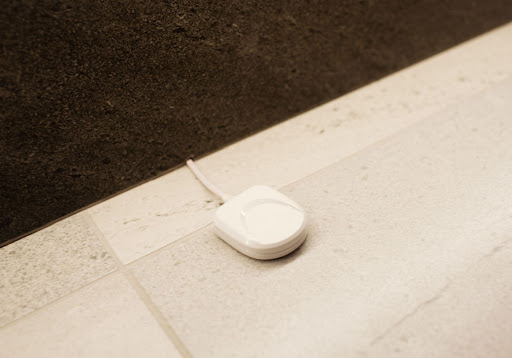Plumbing leaks can cause a wide array of problems for homeowners. Whether it’s water damage to walls, ceilings, furniture, flooring, or a variety of other issues including mold growth, water issues can become a nightmare very quickly. Thankfully, The Coop knows a way you can arm yourself against the consequences of burst pipes, malfunctioning equipment, and floods — water leak detectors and automatic shut-off systems.
Much like smoke and carbon monoxide detectors, installing a detection system can save you and your family a lot of aggravation and expense in the long run. But how do water leak detectors work exactly? Let’s take a look at how water leak detectors operate, why they’re important, and where it’s best to install them.
How Do Water Leak Detectors Work?
In general, water leak detectors function by observing the water flow throughout your home and detecting any unusual patterns that signify a leak. How water leak detectors work will vary depending on the particular model.
For example, some operate by utilizing ultrasonic wavelengths or electronic signals, while others use a mechanical turbine or similar device to count the gallons as they flow through the plumbing system. Other kinds of detectors focus on moisture. There are a host of brands available on the market but what sets high functioning systems apart from mediocre ones is that they include a mechanism that turns-off your whole-house water supply at the main shut off valve when it senses an unusual flow of water. In addition, these systems usually sound an audible alarm and send you an alert via a mobile app, text, or email. This way, no matter whether you’re home or away, your Wi-Fi integrated system will alert you instantly and give you remote-control access so that you can immediately address the situation and minimize water damage.
Some Leak Defense systems can even be connected to your home’s security or home automation system so that you only have to interact with one interface that communicates to you and anyone else you designate such as a third-party monitoring company. This way, if you’re away from home, a neighbor or property manager can be alerted quickly. What’s more, top-of-the-line models will not only turn off the water supply but will also turn-off any of the pumps that move water throughout your home including well pumps, recirculating pumps, etc., so they don’t continue to operate when the water has been cut-off and potentially burn out.
Why Are Leak Detectors So Important?
Now that you better understand how water leak detectors work, it’s likely you already have a good idea of how they help homeowners. By letting you know when there’s a water leak, you’ll be able to take action as soon as possible before it spirals out of control. Given how expensive and time-consuming water damage can be to remediate, a leak detection system can be a “life saver” in the long run.
Often, leaks from aging fixtures or pipes may start small and be undetectable, but over time, they only get worse. Indeed, most leaks aren’t detectable until they’ve already started to damage your ceiling, floor, wall, and so on. Leak detectors can inform you of this occurrence before it worsens and creates damage. Additionally, leak detection systems are incredibly useful in homes built along flood lines or in areas where heavy flooding and rain causes water to seep into the home. Whatever the case may be, you’ll be glad you had a leak detector installed. Oftentimes, Cooper Mechanical is asked to asses water damage after a heavy rain when water has seeped into the house and damaged plumbing and HVAC equipment. Listen to The Coop, better to be alerted at the start of a water issue rather than be faced with all sorts of damage afterwards.
Where Should Water Leak Detectors Be Installed?
Many water leak detection systems have flexible placement options, allowing sensors to be installed in a variety of locations throughout a home. First, we recommend a leak detection device with an automatic shut-off valve be installed on the incoming water supply line. Next, we advise sensor placement near major plumbing fixtures and pipes to sense water in places where it shouldn’t be — like in walls, on the floor or dripping onto ceilings. Sensors can also be placed in areas of your basement which are prone to moisture seeping inside.
Our next recommendation is where a professional plumber, like Cooper Mechanical, can really help. We’ll inspect your home and create a water leak detection system designed specifically for your layout. Often, we build a specially designed, synthetic wood framework, attach it to the floor and carefully seal it. We install it right by the well tank, water heater, water softener, and water supply line which are usually positioned near each other. It’s placed in such a way that water will come in contact with a sensor, triggering the main shut-off valve to turn off and alerting you to a water issue. In the meantime, the framework will keep the water contained in a sealed area to help minimize water damage until help arrives.
As mentioned earlier, it’s extremely beneficial to have a Wi-Fi connected, real-time notification system that will notify you of issues as soon as they’re detected, regardless of whether you’re home or not, along with a shut-off mechanism that immediately turns-off your entire water supply to reduce the chance of major flooding.
If You Have a Plumbing Problem, Call Us Today
While water leak detectors do work by identifying a problem, they won’t solve it — that’s why if you need plumbing repairs and services in Bucks County, PA, you can call us for professional assistance. Cooper Mechanical is happy to help homeowners with all their plumbing needs, water heater repair services as well as assistance with other Plumbing and HVAC systems. For more information and to schedule an appointment, give us a call today.






